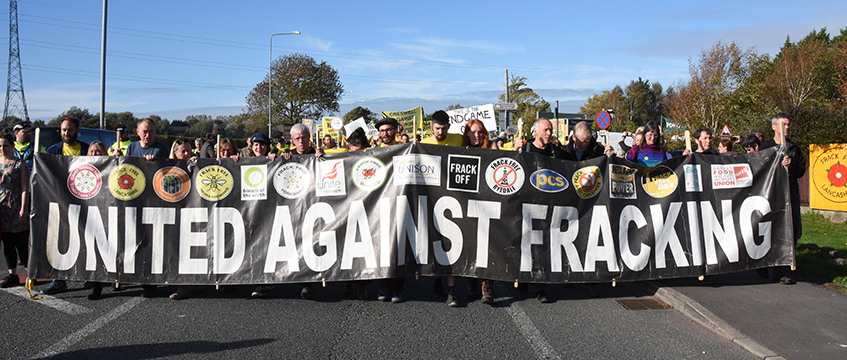The Court of Appeal has upheld prison sentences given to three anti-fracking protestors who disrupted energy company Cuadrilla’s operations in August 2018.
The three protestors deliberately broke a High Court injunction forbidding “persons unknown” from trespassing on and impeding Cuadrilla’s access to the company’s controversial Preston New Road fracking site, near Blackpool.
In September a High Court judge sentenced them to between four weeks and three months in prison for contempt of court, by breaking the injunction. The sentences were suspended on the condition that they didn’t break the injunction again.
The three appealed against their sentences to the Court of Appeal, arguing that the injunction was unclear and the sentences were too harsh. But in a ruling yesterday, a three-judge panel disagreed and upheld the sentences.
The case shows that, while direct-action protestors who deliberately break court orders in such circumstances risk a prison sentence, they are unlikely to be sent directly to jail, according to one of the lawyers on the case.
The three sentenced protestors were part of a large group of people who had been peacefully disrupting access to the site by, among other things, lying in front of or on top of lorries trying to get in and out.
As a result, in June 2018 High Court judge Mark Pelling QC granted an injunction against trespass on the site and against unlawful interference with access to the site.
However, in July 2018 the three defendants – Katrina Lawrie, Lee Walsh and Christopher Wilson – attached themselves to each other and lay in front of the entrance for more than six hours, before police removed them.
Additionally, in August 2018 Lawrie stood in front of a tanker lorry trying to get into the site, causing it to swerve onto the other side of the road.
These actions led to Judge Pelling sentencing them in September 2019.
According to the Court of Appeal ruling, it is accepted that the three were in contempt of court for breaking the injunction. It is also accepted that their protest was non-violent.
“The right to engage in public protest is an important aspect of the fundamental right of freedom of expression and freedom of personal assembly,” Lord Justice Leggatt, who wrote the judgment, said.
However, he said that the terms of the injunction were clear.
“The fact that acts of deliberate disobedience to the law were committed as part of a peaceful protest will seldom provide a defence to a criminal charge,” he said in the judgment.
Even so, “courts are frequently reluctant to make orders for immediate imprisonment of protestors who engage in deliberately disruptive but non-violent forms of direct-action protest for conscientious reasons”.
He upheld Walsh and Wilson’s four-week sentences and reduced Lawrie’s from two months to four weeks.
Tom Roscoe, who acted for the defendants, said that the decision “gives useful guidance on the approach to sanctions for contempt of court arising from non-violent protest activity”.
In particular, he said: “Deliberate breaches of injunctions in that context may attract imprisonment as a sanction, but it will very often be appropriate to suspend the sentence; and when considering the harm – or risk of harm – caused by the breach, it is necessary to consider whether the harm was of the sort that the order was designed to prevent.”








